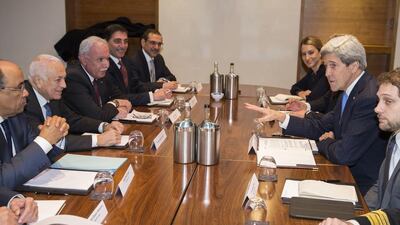New York // US secretary of state John Kerry met the Palestinians’ chief negotiator and the Arab League secretary general on Tuesday as he seeks a compromise over a Security Council resolution drafted by France that calls for multilateral negotiations and a two-year deadline for a peace agreement.
Palestinian officials have increased pressure on the United States by insisting they will submit their own draft resolution to the UN council on Wednesday that sets a two-year deadline for a complete Israeli withdrawal from the Occupied Territories.
If the Palestinian draft is submitted by non-permanent member Jordan, it would have almost no chance of surviving a vote, but the move “is putting useful pressure”, a European diplomat on the council said.
However, “It’s better to be working on something that can be a solution for everyone rather than ending up with a very difficult Palestinian text that will end up with a veto.”
A US veto now would probably anger the Palestinian Authority and Arab allies at a time when they are helping the US fight ISIL. It would also damage Washington’s credibility and alienate the Europeans as the consensus in a number of European countries shifts toward supporting unilateral recognition of Palestinian statehood.
European officials, increasingly frustrated with Israeli policies and the collapse of US-led peace talks earlier this year, are pushing for a resolution drafted by France, with input from Britain and Germany, that calls for international peace talks, rather than US-brokered direct talks, that would include the permanent Security Council members and Arab countries.
“We’ve reached the conclusion that the two parties can’t do it themselves, even with US help,” the diplomat said.
The French draft resolution would set a framework similar to the one established by the Arab Peace Initiative, he added, but set a two-year deadline for the conclusion of talks. The plan reportedly supports the 1967 armistice borders and may not include the Israeli demand – backed by the US – that the Palestinians recognise Israel as a Jewish state.
But Washington is reluctant to pressure Israeli prime minister Benjamin Netanyahu ahead of a general election in March.
It is “very difficult and complicated because we believe very deeply that nobody should somehow interfere or do something that might be perceived of as interfering in the course of that election”, Mr Kerry said before meetings with Saeb Erekat, the chief Palestinian negotiator, and Arab League secretary general Nabil Al Araby.
Before meeting Mr Kerry in Rome on Sunday, Mr Netanyahu said: “We will not accept attempts to dictate to us unilateral moves on a limited timetable.”
Mr Kerry, who met French foreign minister Laurent Fabius on Monday to discuss the developments at the UN, may be trying to persuade the Palestinians and Europeans to hold off on any action until Israel’s new government is formed.
“What we’re trying to do is have a constructive conversation with everybody to find the best way to go forward in order to create the climate; the atmosphere; the political space ... to be able to go back to negotiations,” Mr Kerry said, adding “we’ve made no determinations other than that ... about language, approaches, specific resolutions, any of that.”
But so far there has not been “any sort of indication from the US that they’re ready to actually engage in a negotiation” over the resolution, “and this is what we’ve been discussing with them for many weeks”, the Security Council diplomat said. “We think the US should be on board at some point.”
The Palestinian ambassador to the UN, Riyad Mansour, said that the French resolution was “very, very close to the Arab ideas”. He said on Monday that Palestinians supported the multilateral peace talks called for in the resolution. “We tried direct negotiations for 20 years and they failed,” he said. “That is history.”
The Obama administration may be divided over the European resolution, with Mr Kerry reportedly opposed to it and the president’s national security adviser, Susan Rice, in favour of a compromise.
Israel opposes any imposition of a time frame, and if the French resolution went to a vote before March, the US might veto it.
But the Europeans appear unlikely to agree to wait until after the elections. “Our view is there’s no point in waiting, there’s always good reasons not to do anything,” the council diplomat said. “For us this is not something we are ready to say: ‘OK let’s wait anther four months.’”
The mood within the US administration in the wake of the failed talks and acrimonious relationship with Mr Netanyahu’s government may lead to a position where Mr Kerry offers to abstain from vetoing the French resolution, perhaps if the countries agreed to hold off on an immediate vote, analysts said.
“I’m pretty positive he’s saying to [chief Palestinian negotiator] Saeb Erekat, ‘we can’t do this now ... and let’s cross this bridge at a later stage because if you push this now it will only embolden the right in Israel”, said Diana Buttu, a former PLO spokeswoman.
A US abstention on a resolution forcing conditions on Israel would be unprecedented, but “nobody assumes it to be as clear cut as it used to be at previous Security Council visits by the Palestinians”, said Ziad Asali, president of the American Task Force on Palestine, a non-profit in Washington that supports a two-state solution.
“More nuanced voices” within the administration support negotiating over the French resolution so “that it can be at least not vetoed”, Mr Asali said. “An abstention is a possibility now, a possibility that does not seem to have existed even weeks ago.”
Whether or not the statehood efforts at the UN succeed, Palestinian Authority president Mahmoud Abbas is under growing domestic political pressure, as unrest and violence in the West Bank and Jerusalem grow.
“Abu Mazen is doing it to demonstrate he’s got some sort of alternative plan,” said Ms Buttu.
tkhan@thenational.ae

